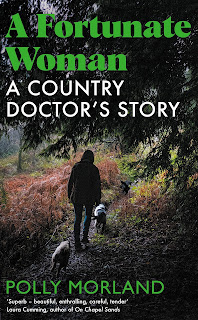Book - A Fortunate Woman: A Country Doctor’s Story
Tony Cross is reading all the books on the longlist for the Baillie-Gifford Prize for Non-Fiction 2022. Today it's the turn of A Fortunate Woman: A Country Doctor’s Story by Polly Morland ...
This is a beautifully written book that does a number of different things. It follows a country GP through 2019 to 2021. It covers pre-pandemic and then pandemic. It tells the story of her day-to-day existence.
It is also the memoir of that GP. We find out how she ended up here. We hear stories from her past experiences that have helped shape who she is and how she works now. Some of these are incredibly moving. I found myself with tears in my eyes on a couple of occasions.
Then it is the story of illness, grief, fear and loss. The book tells stories of the dying, of those suffering from Alzheimer’s disease, of Covid-19, of potential miscarriages and how these things affect the GP herself and the relatives around them.
Weaved into this story are two other threads. It is a follow-up and tribute to John Berger’s A Fortunate Man, which was published in 1967. This was a book about a country GP. It was told in a similar way to this one. We never really know where the place is or the real names of the Doctors and their patients. But it is a meditation of the value of GPs. Polly Morland tells a little of the story of that book in this. Because the two books are set in the same town. The Fortunate Woman is the successor of the Fortunate Man. So, this book also gives us – to sue an ugly word – closure of a sort on that previous book.
The other thread is what we’ve lost as the relationship between GPs and patients has become less personal, especially in urban areas. Despite all evidence that a close relationship between both and a more personal approach benefits both Doctor and patience. Our Fortunate Woman has known her patients over time. She knows that if a certain person comes into her surgery that there is a serious problem because they only come in when the absolutely have no choice:
“She knows an A&E Doctor at a nearby hospital who won’t let any farmer be discharged without first being reviewed by a consultant; the very fact they’re there is usually an indication that something’s seriously wrong.”
All of that is neatly and beautifully tied together in this small book. Like A Fortunate Man, A Fortunate Woman has lots of photographs to illustrate it – this time by Richard Baker. This reminds me that the other thing this book does is write well about nature and weather, helped by Baker’s photographs.
All of this would make it an interesting read but then Covid-19 raises its ugly head and we see some of what the country went through. It is astonishing, reading this, that there is anyone left in the NHS capable of working. They must be exhausted physically and mentally. But it is the first book I’ve read where Covid-19 is a central part of the story, which makes it seems like it is all over. Even though it isn’t.
When I saw the title of this book I thought I was going to hate it. I thought it was going to be twee. It isn’t. Morland writes wonderfully well, almost poetically at times. The story is worth telling and is told pretty unsentimentally and you find yourself at the end admiring the Fortunate Woman and all those like her.
In her epilogue Morland quotes Berger:
“We in our society, do not know how to acknowledge, to measure the contribution of an ordinary working Doctor. By measure I do not mean calculate according to a fixed scale but rather take the measure of.”
This book does a fine job of taking that measure and it makes you realise that we have become a society that needs to take the measure of not just an ordinary working Doctor, but also an ordinary working anyone. We are a society that – to use a cliché – ‘knows the price of anything, but the value of nothing.’
Follow Tony on Twitter @Lokster71
Image - Amazon






Post a Comment